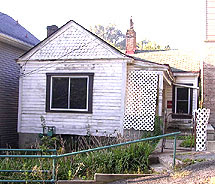
Welcome to Blightsburgh. Last week I read this story about a Northside woman's struggle to deal with the mess and nuisance of the house next door. This woman's struggle has validated my feeling that the Redd Up program under Mayor Ravenstahl has been a huge disappointment. Don't get me wrong. The public works folks and the volunteers have been working really hard, as evident by the hundreds of photos on the city of Ravenstahl-burgh's website, but I've never been in a city with more abandoned houses, more overgrown lawns, and more eyes sores than the city of Pittsburgh.
This city does not have any standards. At our house in Beechview(which we still own ), we worked hard to keep our yard looking decent, but what about the house across the street(pictured above and below)? A complete disaster. On top of the house across looking street looking like a landfill, the people living there were even worse. They sell drugs, do drugs, curse all day and night at each other, and have their friends over honking the horns and playing loud music at all hours of the day and night.
This was unacceptable, and it eventually forced us to move out. We won't start a family in that environment. Hundreds of calls to the police by us and our neighbors did nothing to fix the situation. In fact, one officer, after responding to my wife's call to the police, told her that they couldn't do anything and that we were "SOL." So, the city and its police force let a house of unemployed drug users stay and in the process lost a dual income earning and taxpaying married couple. Its a shame too, because we lived on a great street with great neighbors.
But its not just Beechview. In just about every neighborhood here in the city of Pittsburgh you will see abandoned houses that have boarded up and have not had their lawn's cut in years. You will hear from friends who are living next door to someone who does not cut their lawns, who leaves garbage on their front porch and lawn, and who has zero regard for their neighbors across the street or next door to them. I know this because I lived through this the last 6 years I lived in Greenfield and Beechview. I see more and more of it every day while I've been campaigning for Mark DeSantis throughout the city. Last weekend, while we were in Point Breeze, I almost tripped and fell down a flight of stairs at a house with garbage and debris covering its front porch. This past weekend I saw more of the blight in Oakland, Squirrel Hill, East Liberty, and Highland Park. Each day I see it in other neighborhoods as I take the T into work.
So how bad are we compared to other cities? We're not the worst, but Pittsburgh does have the 5th highest rate of vacant properties per 100 residents. Additionally, the City has 200 more vacated properties than it did under Mayor O'Connor, further proof that Redd Up under Luke has a long way to go. So what is the mayor's plan? Up in Buffalo, Mayor Byron Brown has proposed an ambitious plan to spend $100 million razing 5,000 vacated homes over the next 5 years.
The city has a nice showcase of some of these properties on the website where they are trying to sell the dilapidated houses. Here are a few of houses around the city that are for sale:
 |  |
 |  |
 |  |
 |  |
 |  |










